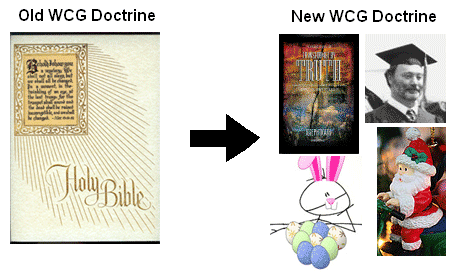WCG: Christmas Celebration is Not About Whether Jesus Was Born on December 25
TRANSFORMED FROM TRUTH
WCG sent out an email stating:
Speaking of Life, with Dr. Joseph Tkach: “The Meaning of Christmas” — The Christian celebration on December 25th is about Jesus, not about whether he was actually born on that day.
——————————————————————
Comments by COGwriter
Of course, since pretty much everyone who has investigated the matter knows that it is close to impossible for Jesus to have been born on December 25th, J. Tkach has decided to try to suggest that Jesus is the subject of Christmas.
And those who have looked into the history and adoption of Christmas celbrations realize that that is also not true. As reported earlier on this news page, this time period was adopted because pagans claiming to be Christian could not resist participating in parties for pagan gods that were held then (please see news item WCG and Christmas: “Jesus is the Reason for the Season”?).
Christmas shifts emphasis from the true God to pagan substitutes. For example, notice something that the Apostle Paul was inspired to write:
For we must all appear before the judgment seat of Christ, that each one may receive the things done in the body, according to what he has done, whether good or bad (2 Corinthians 5:10).
Yet, Christmas teaches children that throughout the year that they need to sit before the judgment of Santa Claus–a pagan substitute for Christ.
Wreaths were used as pagan symbols during the Saturnalia and still are somehow supposed to now indicate honoring the God of the Bible.
Notice a little bit from The Catholic Encyclopedia:
The Gospels. Concerning the date of Christ’s birth the Gospels give no help; upon their data contradictory arguments are based. The census would have been impossible in winter: a whole population could not then be put in motion…
Natalis Invicti. The well-known solar feast, however, of Natalis Invicti, celebrated on 25 December, has a strong claim on the responsibility for our December date. For the history of the solar cult, its position in the Roman Empire, and syncretism with Mithraism, see Cumont’s epoch-making “Textes et Monuments” etc., I, ii, 4, 6, p. 355…The earliest rapprochement of the births of Christ and the sun is in Cypr., “De pasch. Comp.”, xix, “O quam præclare providentia ut illo die quo natus est Sol . . . nasceretur Christus.” – “O, how wonderfully acted Providence that on that day on which that Sun was born . . . Christ should be born.”…
Cards and presents. Pagan customs centering round the January calends gravitated to Christmas…
The yule log. The calend fires were a scandal even to Rome, and St. Boniface obtained from Pope Zachary their abolition (Martindale C. Christmas, 1908).
Of course Christmas trees and many other symbols associated with modern Christmas celebrations are also of pagan (pre-Christian) origins. Here is some of what Wikipedia mentions:
With likely origins in European pre-Christian cultures, the Christmas tree has gained an extensive history and become a common sight during the winter season in various countries. Patron trees (for example, the Irminsul, Thor’s Oak and the figurative Yggdrasil) held special significance for the ancient Germanic tribes, appearing throughout historic accounts as sacred symbols and objects. According to Adam of Bremen, in Scandinavia the Germanic pagan kings sacrificed nine males (the number nine is a significant number in Norse mythology) of each species at the sacred groves every ninth year…
Other notable traditions in relation to Christmas have also been derived from Germanic pagan practices, including the Yule log, Christmas ham, Yule Goat, stuffing stockings[4], elements of Santa Claus and his nocturnal ride through the sky, and surviving elements of Pre-Christian Alpine traditions (Christmas Trees. Wikipedia. viewed 12/21/07).
Essentially, pagans who professed Christ wanted to keep their pagan symbols and celebrations and that is what happened to make Christmas.
Christmas celebrations do not emphasize Christ. They emphasize pagan substitutes and is that really something the the God of the Bible would want?
An article of related interest would be What Does the Catholic Church Teach About Christmas and the Holy Days?
 |
Tweet |
|